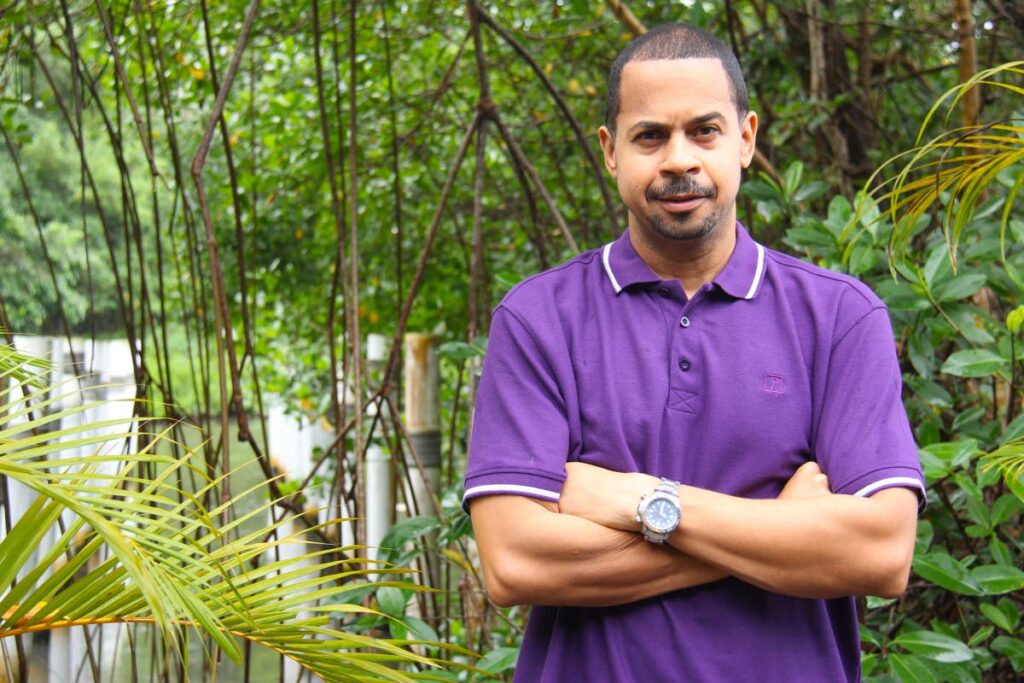Patries Ramkaran is breaking down barriers
Written by Janelle De Souza on August 25, 2024

PERSISTENCE and determination has led Patries Abigale Ramkaran to push through disappointment, failures, discrimination and scorn become one of the few female contractors in the country.
Ramkaran founded Ramkaran Contracting Services Ltd in 2005 at the age of 21 which, at first, only provided construction services. Now, it also provides design and build, janitorial and facilities maintenance services.
She said the core business is construction from foundation to finish including drainage, retaining walls, finishes, plumbing, electrical work and more, as well as a lot of refurbishment work for the government.
But in 2008 there was a downturn in the economy, so she decided to diversify and provide janitorial and maintenance services, which is supplied mostly to public sector clients. Then, just before the covid19 pandemic, due to another downturn in the economy, corruption stymieing opportunities and the highly competitive nature of the industry, she started the design service. This is focussed on private sector clients and residential designs.
Ramkaran told WMN her motivation to start her own business came when her hopes of becoming a permanent employee at Petrotrin was dashed. She was working at the energy company on contract but thought she would be retained and Petrotrin was where her career would begin. But it was not to be.

Patries Ramkaran, one of the few female contractors in TT. Photos courtesy Patries Ramkaran. –
“With that disappointment I said, ‘You know what? I want to be my own boss.’ So I incorporated this company without knowing the direction it could go.”
She also did not like wearing corporate clothing and construction afforded her the opportunity to wear jeans and, of course, she had a background in civil engineering and construction management.
She continued to build the business while working full-time at other companies and in 2007 she successfully tendered her first project – to upgrade the Shell recreational grounds in Rio Claro.
Ramkaran said she learned a lot during that project. One of her harder lessons was the difficulty for small businesses to get financing from financial institutions. She said she thought it would be easy as it was a government project but the banks were reluctant because of the government’s reputation for late payment. So she had to use her savings and got loans from friends and family.
Another difficult lesson learned was to be careful about who she hired. She recalled her equipment supplier at the time removed their equipment before the job was done. Only much later did she find out the supplier had tendered for the job but did not get it so they attempted to sabotage her.
“It was a rough start. I lost money but I think failure is what makes us stronger. It didn’t stop me from pursuing the dream I had.”
After the project was completed, there was a downturn in the economy so she continued to work on in the corporate world. Finally, in 2012, she was able to leave that life behind to focus on her business full-time.
But why a construction business?

Patries Ramkaran, founder and managing director of Ramkaran Contracting Services Ltd. Photos courtesy Patries Ramkaran. –
“I believe a business must be a match for the entrepreneur or business owner. It should be something you like. And construction is something I always liked from my first exposure to it at secondary school where they taught us technical drawing.”
After that, she investigated careers that would allow her to continue using the skill and discovered civil engineering. That led her to attended San Fernando Technical Institute where she got diplomas in civil engineering and construction which, she said, gave her a wide perspective in the different components of the construction industry.
Later, in 2011, she earned a Bachelor’s in construction project management from Heriot-Watt University and became a certified project management professional with the Project Management Institute. She also gained an MBA in entrepreneurial management from the Australian Institute of Business via distance learning in 2017.
Ramkaran she said at first the motivation to start her own business was financial freedom and more flexibility with her time. But she soon realised as the owner she had to work harder than everyone else and sometimes pay herself less that what she got working in corporate.
“Now, as managing director of Ramkaran Contracting, my driving force is breaking barriers. Because, deep inside of me, in terms of purpose, I really believe I’m here to take the difficult path so persons after me who want to pursue something similar could be motivated and learn from my experience.”
She said the main challengers on her path were getting initial capital investment and investment for expansion, corruption in the procurement process and the treatment of females in a male-dominated industry.
She said over the past few years there has been a push for entrepreneurship but Trinidad and Tobago does not really have an ecosystem to support it, because getting funding from financial institutions was still frustrating. However, she has been able to build a relationship with one of the banks, so at least her projects were now being considered.
She added that, while things have improved since the Public Procurement and Disposal of Public Property Act was proclaimed and companies had more opportunities to tender for projects, all bidders were still not given a fair chance in the evaluation of tenders.
She also recalled, when she had started working in construction, she faced unpleasant remarks and opposition because of her youth and more subtle discrimination and disrespect because she was a woman. She was ignored or not being taken seriously when she spoke, subtle comments were made about her body and she was paid less than her male counterparts.
Even now she said she was sometimes stereotyped in meetings. When conducting a site visits, some found it difficult to believe she is the managing director or that she knows what she is doing.
“How I overcame that was by knowing my worth and having the knowledge so if somebody says X and it is incorrect, I know the right thing in terms of construction practices.

Patries Ramkaran, founder and managing director of Ramkaran Contracting Services Ltd. Photos courtesy Patries Ramkaran. –
“In addition, you need to be assertive and know who you are. You can’t be intimidated by anyone. I was able to learn that from a young age. If it wasn’t for my persistence and driving force, I would have given up swimming against the tide a long time ago.”
Ramkaran said she has seen an increase in the number of women who study civil engineering and construction at tertiary institutions, but she was not seeing more female contractors. Therefore she tries to hire women to give them opportunities and mentor them.
She is also a former member of the board of directors of the Trinidad and Tobago Contractors Association and the Association of Female Executives of Trinidad and Tobago so tries to “pay it forward” through those organisations by participating in their programmes.
In the beginning, she said another challenge was maintaining a work-life balance, especially as she grew up in a traditional home where her mother was a housewife. She felt she still had to do everything in the home even as she felt she had to manage everything in her business.
After a while she found that balance as she realised being the business owner allowed her to set boundaries. Therefore, when she is at work, she is present and focussed on her tasks and responsibilities. And when she is with her daughter, 15, and son, eight, she may turn off her phone or would not respond to work emails or messages to stay in the present with them.
She said it is necessary to prioritise tasks and delegate responsibilities to others so she does not have to shoulder all of the workload. It is also important to made time for herself and de-stress so, as she likes travelling, she takes short vacations to reflect and recharge.
Still, Ramkaran has plans to do more.
In 2018, Ramkaran Contracting purchased ten acres of land in Tableland to work on its first land development project. The team prepared the design and already has the necessary statutory approvals for the Royal Pine Housing Estate, which she describes as sustainable and environmentally-friendly living.
The plan involves 19 single family units, 20 town houses, three apartment buildings, a café, a leisure centre, a swimming pool and a tennis court. Each home is expected to be equipped with solar power, rain water collection and hydroponics systems, and Ramkaran Contracting is already in talks with a solar company to provide the solar systems.
“It grew out of a passion on mine to create affordable housing for the region. It’s a very hard reach but I’m still trying to pursue it. Part of the development, about 23 homes, will be gated and the other part won’t. And now that the economy is stabilising, we agreed to re-commence in January.”
She explained that the area is known for pineapples so the company wants to collaborate with the farmers in the area. Therefore, the theme of café would be pineapple-based and the menu would include items like piña colada and pineapple upside down cakes.
The project would also involve teaching visitors and members of the community about the process of cultivating pineapples and showing them how to make their own pineapple-flavoured food and drinks.
“The café should help stimulate the economy in that region of the island. I strongly believe each area or constituency should have some sort of economic activity in which locals can sustain themselves and employ others.”
She added that just before the pandemic Ramkaran Contracting had expanded to Guyana but that operation had to be closed down. So another plan is to one day expand the company regionally.
Ramkaran said she has no intention of increasing the number of services the company provided but she intends to one day change the business model. In about ten years she would like the company to be able to finance the structures it builds or get investors involved so it could offer building loans to those in the lower and middle class.
“Hopefully we can educate people about home ownership because that’s my fear for the next generation – that they may not be able to own a piece of property or anything like that. Owning a house is a right but it’s so farfetched and unrealistic to some and we want to change that. That will be part of our corporate social responsibility.”
The post Patries Ramkaran is breaking down barriers appeared first on Trinidad and Tobago Newsday.




